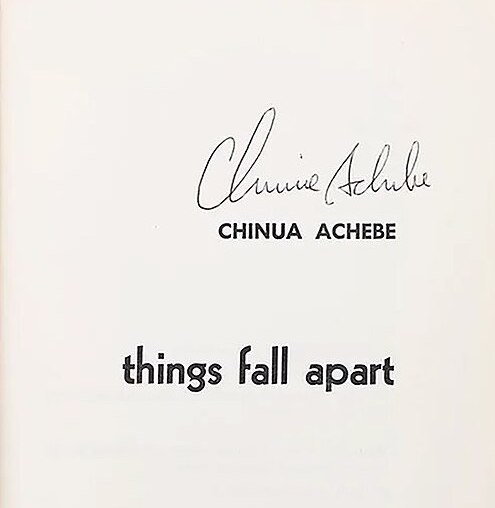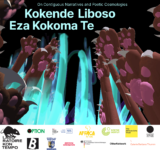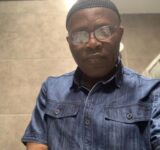With her mother’s death still heavy on her heart, Onyinye’s father makes arrangements for her to marry the person of his choice and the situation goes out of control.
Onyinye levered her naked self out of bed and walked in nervous trots round her room. She got to her wardrobe, turned the brass knob, pulled the door open, and picked a pair of scissors. She wanted everything to end. Quick and soon.
Facing the Victorian wall mirror, she held back a handful of her hair in one hand, the pair of scissors in the other. She stared deeply at the mirror, and saw many faces: the dark-skinned face of a lady full of affable smiles; the beaming face of a tender young girl that giggled as if a box of chocolates had been offered her. Countless faces, she saw, but only one face was she sure of: her real face, ashen by choicelessness, saddened by the loss of what used to be.
The scissors swished as it went into her hair. And what followed were tufts of black hair that smelled of Apple relaxer. They fell on the beige rug, into the pulled-out drawer, on her bare shoulders. The scissors hissed while being withdrawn and driven in again, confidently this time, like its handler were sure. Sure of getting rid of the once entangled swell of adorned hair. Sure of reducing her glorious hair into long strands of blackish fluff that floated in air till they fell to the earth.
The cool air around her room was heavy with tense silence. Tears rolled down her eyes, but this was not the first time she was crying about the turnout of things. She cried yesterday. And the day before. She cried two months earlier. The tears of two months earlier were entirely different from her present tears: the tears of two months earlier were for her mother, Patricia.
Patricia died in a plane crash in Lagos, the same day the Nigerian first lady died. On the morning of the day Patricia died, her husband Mr. Commissioner, was out in his villa’s garden with Onyinye. Having just returned from the United States after completing her masters in Neuroscience, Onyinye stood by her father while he plucked garlands of bougainvillea and stuck them in her hair. She smiled, and often times, oohhed and aahhed, the kind of funny sounds she made whenever her father said something about her being his pride, about her being his best and only daughter.
Onyinye felt really happy to be home again after so many years. And as she stood there by her father’s side, Mr. Fashakin, one of Mr. Commissioner’s aides, called to the house and her father went with him into his study. After Mr. Fashakin delivered the sad news, Mr. Commissioner looked up, down, and up again, as if something uncertain had fallen but was worth searching for. Then he wept like a child.
Onyinye, sensing her father had been away too long, went searching for him. She found him half-sitting on the high-backed chair; she found him hunched over, his head buried between his knees as he cried. She looked at Mr. Fashakin, her clouded eyes prompted him to speak.
“Your mother died in a plane crash. I’m sorry,” Mr.Fashakin said, his tone dry, almost in a whisper.
The solemn words of Mr. Fashakin to Onyinye hung around the cramped space of the study for what seemed a very long while. Though they resonated in her mind, she felt they were more lavished on the outside: lingering on the walls, snugly arranged with the large volume journals on the shelves, flying around the room as the ceiling fan seemed to creak more loudly. She sank on her knees and wept, too. Neither of them stood up to console the other after Mr. Fashakin left the study.
Later that night, when Onyinye and her father would sit opposite each other on the sofa in the antique-decorated air-conditioned living room, they would listen to the newscaster reel off headlines. And when the news of Patricia’s death was announced, a few minutes after the news of the first lady’s death was overly elaborated on, sights from the crash scene would be flashed across the many-inch screen. Onyinye would imagine Patricia, a woman of elegance and many years in politics, paying attention to the safety rules spewed out by flight attendants before the plane crashed – rules which, like her mother, were gripped with senseless fear, sounding in her mind like broken words of no mean value. Mr. Commissioner would turn off the television to sit glumly at the dining table with Onyinye, the supper of pounded yam and egusi would then be swallowed, ball by ball, in silence, tasting like water, only that it made them heavy, and offered energy for more tears as they lay shivering on their beds.
But now, as she stood in full view of the mirror, old memories washed over her. She wondered if Patricia would allow Mr. Commissioner to do what he planned. Or what he had done?
A mass of her hair littered the floor around her; yet, more hair still covered her head. She gently dropped the scissors on top of the tiny drawer beside the mirror. The morning sun took a peep through the blinds, casting furtive boxed shadows of black and golden yellow light on her bed. A dog, shattering the stillness of the whole yard, barked outside; then, everywhere was silent again. Silence, this preening silence, Onyinye cherished. It was quietness that helped her recall memories of the recent events in her life. She grieved to remember the memory of her love life.
Phillip was Onyinye’s boyfriend at Massachusetts, where she schooled. Though his parents were black and Nigerian, and had lived in America for only five years, Phillip claimed to be an American. He denied his Nigerian origin; he denied that he was black (though he never bleached), until his father died one summer and his mother made an unannounced decision of moving back to Nigeria. Phillip, caught in his own web of indecision, accepted to return with his mother. So, sometime in June of the year before Patricia died, Phillip was in Nigeria.
During one long winter holiday, Onyinye flew back to Nigeria. When she came to visit Phillip, he was out on the posh verandah that ran almost a full circle round his father’s house in Lagos, peering into the screen of his IPhone when Onyinye drove in. And when he welcomed her, she was surprised at how much his accent had changed, at how much Americanness he had lost, at how much Igbo he added while he spoke. His clothes were a casual bright green T-shirt and baggy denim trousers. The skin around his face looked incredibly smoother that she wished she could play her hands on it; instead, she smiled and said, “This Nigerian weather is really good for you.”
Ushering her into an oversized room decorated with potted flowers, wooden figurines that sparsely dotted the étagѐre, and colour wall-photos, he asked her if she would love to eat anything. No, she said, I only want to put my head on your lap and listen to what I’ve missed. The roguish twinkle in her hazel eyes was obvious. Time went by as they talked and laughed, and Onyinye didn’t know when or how the conversation turned around to pivot on marriage and future plans. She only remembered words bubbling off her mouth, her head nestled between his thighs, while he rolled and unrolled the curly tendrils of her hair with his fingers.
Phillip said, “If we get married, I’ll really love you to take good care of me, my kids and my home. Inugo?”
“I heard you. And of course, I’ll take good care of you. That’s what every sensible wife does for her husband.” Peals of laughter left Onyinye’s mouth after she replied him.
“I don’t like the idea that married women work and make money. Their rightful place should be here, at home, doing house stuff.”
Onyinye turned her head to stare at him. She pretended not to hear what he had just said.
Phillip continued, “I will be the sole breadwinner, while you will be the obedient housewife. No office job. No businesses.”
“You won’t want me to work.” It nearly came out of her like a question. She was a bit choked, surprised, as she fought back the alarm that was mounting in her voice.
Phillip retorted, “Hell no. Women should not be as ambitious as men.”
“Oh my God. Some people are just unbelievable.”
At this, she got up in a fit of rage, grabbed her purse, walked out into the blistering sun, and drove back the way she came. Phillip never called or messaged her after that day. She waited and waited, and when she got tired of waiting, she gave up on the relationship. After all, no one ever dictated her life. Until now.
The air conditioner in Onyinye’s room squealed. Although everywhere in her room was cold, the floor beneath her feet, where she had been standing for over half an hour, was warm. She picked up the pair of scissors again, hesitated, and dropped it on the floor. The blades of the scissors hid near her right foot, somewhere beneath the small heap of her hair. Her gaze at the mirror lingered. Should she fight her father? She searched the mirror for a sign on the face it reflected, a sign that will perhaps, reveal the hidden strength for such a fight.
Her breasts’ region was now wetted by tears that travelled from both eyes, met at her shapely jaw, and drizzled onto her chest. She realized that the tears of the day before were fuller than today’s, and highly redemptive – fuller because she must have cried out the moistness of her tear gland, for she woke up to a drenched pillow; and highly redemptive, because she gave Patricia a final mourning.
It was raining in massive beads when Mr. Commissioner told her of the new arrangements he had made. They were out on the front balcony, where one could get a stretched view of Ikejiani lane. As it was a Government Residential Area, no one was allowed to hawk wares along the streets, unlike other typical streets of Lagos. Trees married each other- coconut fruits on almond trees, almond fruits on neem trees- and the gardens and patches of grass-green left the streets verdant, and flushed with warm greenness.
Mr. Commissioner sat on a cushion chair, while Onyinye stood by the silvery railings watching all kinds of luxury cars veer down the lane. It wasn’t that she was not used to seeing such cars and the trees and the gardens that lined the lane, but she found the view strangely exotic that afternoon.
“Do you know Professor Uwadike’s son, the one that just finished his doctorate in economics at Harvard?” Mr. Commissioner asked.
Professor Uwadike was the former minister of finance who often came uninvited to see Mr. Commissioner. She was familiar with his high-pitched tone, his tonsured head, the red cap she wondered if he ever removed. But not his son.
“No,” she replied.
A convoy of black-armoured vehicles plied down the road; the blaring wail of their sirens made Onyinye press her palms against her ears.
“That must be my good friend, the General Superintendent of the Nigerian Police. He is closely followed by his men. This country is no longer safe,” Mr. Commissioner said, as he shook his head and narrowed his smile at the way the cars came and disappeared.
His eyes on Onyinye, he continued, “It is very important that you know him, ehm, Professor Uwadike’s son. He will soon become someone special and important to us.”
“Dad, how do you mean?”
She did not see him flash a conceited grin.
“Professor Uwadike and his people will be coming to see you tomorrow.”
Turning her glance at him, she caught Mr. Commissioner’s smug smile; she caught his eyes dancing all over her.
“What for?” She asked.
“His son Chima will be asking your hand in marriage, and I expect you to be at your best behaviour. I expect you to say yes, and to welcome him and his people as your new in-laws.”
In utter disbelief she felt her senses swirl, but she was quick to regain composure. “What do you mean by marriage?”
Totally shocked, she left her mouth wide open after she asked this question.
Mr. Commissioner replied, “My daughter, you are ripe enough for marriage. This is what happens when we train you young girls in schools abroad. You forget our culture. You forget that your rightful place at the end of the day is in your husband’s home. And this is entirely your mother’s fault. When she should have taught you things like this, she didn’t. Now she’s late, and I’m to answer your every stupid question. I have made my decision, and it is final. Besides, Chima is a very good boy. You will like him.”
“I am not getting married to a man I don’t know. Dad, how could you think and even plan such a thing?”
“How dare you question my decision?” Mr. Commissioner thundered, “I am a commissioner. I am authority. The arrangement had been made before you were even born. It is what keeps politics going.”
Onyinye nodded her head and said, “Aha! I see. The arrangement. Then I won’t be a part of this arrangement. I won’t be a part of your dirty politics. I won’t- ”
Mr. Commissioner slapped her in one deft swing of his arm, then said, entirely in Igbo, “Onyinye, what gave you the audacity to talk back at me? I gave you a name. I gave you a home. I am your father and commissioner. Our people once said that if the crayfish had listened to his ancestors, conditions under the water wouldn’t have made it bend. You will go through this marriage. You will listen to me and act as I say.” He said something caustic and stormed his way back inside, pulling the cadet-blue portiѐre from its rail.
Examining her left cheek with the mirror, Onyinye saw that signs of the slap had disappeared. She stopped crying, for Chima and his people would soon arrive. She padded to her bed and took a cursory look of the aso-oke that lay full- length on top of the quilt. Just then, a brief knock came on her bedroom door. It was Tope, one of the house-servants. She quickly put on her blue flannel tank top and opened the door a crack.
Looking closely at Onyinye’s almost bare scalp, Tope exclaimed, “Aunty, what happened to your hair?”
Onyinye ignored the question and said, “Clear up this room when I’m away.”
Tope, not paying attention, continued, “Eish! Aunty mi, please don’t be angry with Mr. Commissioner. If he was my father, I would obey him. The visitors are here sha. Your father requests that you get ready.”
Onyinye slammed the door in Tope’s startled face. She washed up in the bathroom, dried up by the doorway of the bathroom, and applied make-up at her dressing table. Getting dressed in her aso-oke, she left out her scarf. She was ready to face her husband-to-be.
Meanwhile, Chima’s people arrive in droves. One after the other, they pulled up their cars in Mr. Commissioner’s expansive garage. Mr. Commissioner invited his people from the village too. Through her window Onyinye saw their proud faces: men that roared with laughter, women who tagged alongside their husbands like obedient cats, putting on their practiced smiles as they greeted formidable men, genuflecting when necessary. Except Aunty Nkiru, who stayed longer than the rest in Mr. Commissioner’s house when Patricia died, she was unable to recognize any of them. The loud greetings of the visitors echoed through the walls of the inner house. And when the time came for Onyinye to welcome her new husband’s people she was sent for by another one of Mr. Commissioner’s house-servants.
Walking into the living room, she noticed that the room, which now smelled of lush verdant, had been re-decorated: the wooden sculptures that lined the walls close to the door had been moved, more vases of bougainvillea surrounded the entire space, cushion chairs had been replaced with sky blue plastic chairs. Platters of all kinds of food were arranged on a long narrow table at a far end of the room.
From the corner of her eye, Onyinye caught a glimpse of Chima, who beamed with smiles from cheek to cheek while restlessly darting his bespectacled eyes here and there. Mr. Commissioner and the visitors strained their smiles when they saw her hair, zigzagged at the front, bare scalp shining behind. While she brilliantly avoided Chima, Onyinye exchanged banters and greetings with everyone seated. Afterwards, she returned to her room.
Ten minutes later, Onyinye re-entered the room for proper introduction: it was Igbo tradition for the woman to be properly introduced to her new husband. She was ushered in with loud whistles and ovations. She saw the stern faces of the women present in the crowd harden, but she cared less; in her mind’s eyes, she saw them scolding her for what she did to her hair. Avoiding the victorious look on Mr. Commissioner’s face, she widened her smile as she took in her hands the glass of palm-wine he offered her: tradition demanded that she took the glass of palm-wine from her father and offered it to her husband-to-be.
Full of drama and life, Onyinye danced in a full circle round the room, twirling and dipping; she ambled by Mr. Commissioner, wriggled her wide hips as she danced past her new husband, sunk her knees and straightened them as she glided over the marbled-floor, past the happy-faced visitors and returned again the way she started. On getting to Mr. Commissioner, whose deep fruity laugh swallowed the hoots of the cheery visitors, she emptied the contents of the glass on his face. The whitish drink deflated any form of excitement Mr. Commissioner earlier had. It traced the wrinkles and tiny folds across his face, bulked at his beard, and dribbled slowly onto his glistening agbada.
One of the women screamed, “Eewo! This is an abomination. Tufia.”
Onyinye ran to her room, tied her scarf, grabbed her international passport, pressed it into her bag full of clothes, and walked out hurriedly. She hurried past the commotion in the living room, past the men that tried to calm Mr. Commissioner down, past the plaintive murmur that rose from the visitors, past the small group of native-dressed women that stood at the corner of the room carrying out their hushed conversations while staring disdainfully at her. Through the grassy front yard, out the crisscrossed black metal gates, she strolled down the quiet lane, dense with dripping trees and slushy gravel path, and hailed a taxi.
Okafor Emmanuel Tochukwu was born in Lagos, Nigeria. He is currently studying Electrical/ Electronic Engineering at the University of Benin. His short fiction and essay have appeared in The Kalahari Review, African Writer, Naija Stories, StoryMondo, Uniben Talking Drum, and 8th Annual Ships & Ports Communiqué. His work is also forthcoming in Aerodrome and the first ArtBeat Afrika short story anthology. He also works as an editor at unibentalkingdrum.com and the Uniben Blog. He recently concluded an online writing course with the University of Iowa. An Etisalat and an MTN scholar, he won the Comptroller Charles Edike Prize for Outstanding Essays (2014). Tochukwu is currently working on a full-length debut novel.








This is a lovely read. I haven’t read any other story of an arranged marriage written as beautiful as this. And the way the writer examines the issues of feminism, excellent. This short story is worth a prize and worth reviewing.
Thumbs up to the brilliant writer!
I stumbled upon this magazine after reading a review of it on Brittle Paper. And i must say man, this story had me magnetized to it. The narrative is perfectly lyrical. I’m Currently having my MFA and i must say, the writer got wits and style. I’ll sure recommend this to my guys in class tomorrow.
Morgan, USA
This story had me hypnotized, I wasn’t expecting it to end that way. The story is well written. Thumbs up to the Writer